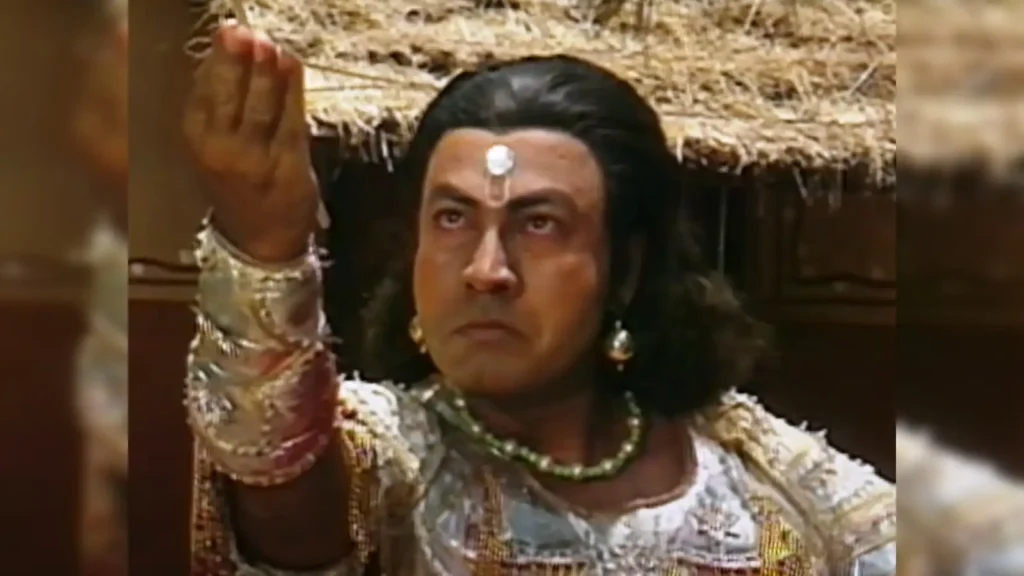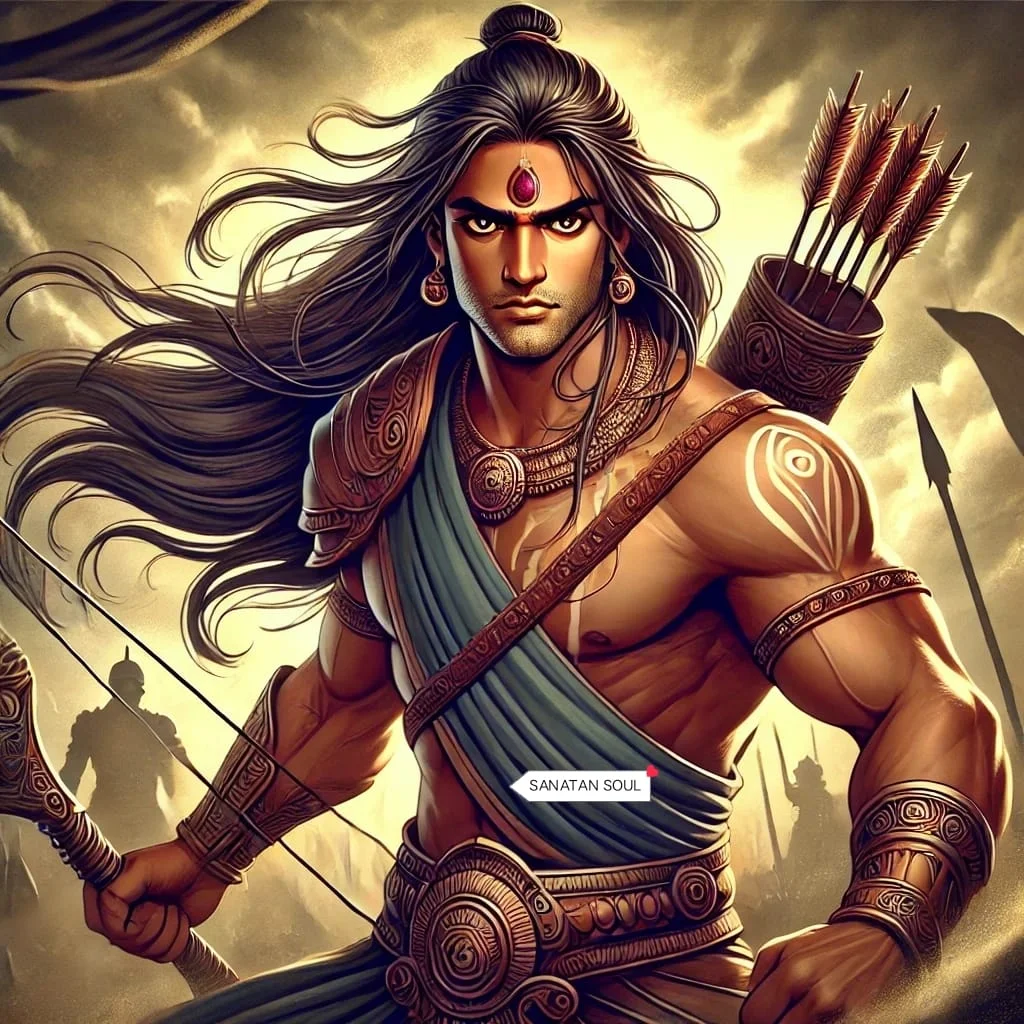The Mahabharata is filled with larger-than-life characters, but few are as intriguing and mysterious as Ashwatthama. He was not just a warrior; he was a figure of immense power, deep loyalty, and tragic downfall. As the son of Guru Dronacharya, Ashwatthama was destined for greatness. Yet, his actions during and after the Kurukshetra war led him to a fate worse than death—a curse of eternal suffering.
One of the seven Chiranjivis (immortals) in Hindu mythology, Ashwatthama’s presence is believed to persist even today, roaming the earth in agony. His story is one of loyalty, betrayal, unchecked anger, and the consequences of war. In this blog, we will explore his origins, role in the war, his greatest mistake, the curse that changed his fate, and his relevance in the modern world.
Birth of Ashwatthama
Ashwatthama was born to Guru Dronacharya and Kripi, a birth that was nothing short of extraordinary. It is said that he was born with a divine jewel (mani) embedded in his forehead, which granted him immunity from disease, hunger, and fatigue. His name, Ashwatthama, comes from the legend that his first cry at birth resembled the neighing of a horse.
Despite his divine birth, his early life was filled with struggles. Dronacharya, though a learned teacher, lived in poverty. Unable to provide Ashwatthama with even a basic living, he sought financial assistance, eventually leading him to Hastinapura, where he became the royal guru to the Pandavas and Kauravas.
Growing up, Ashwatthama trained alongside the Kuru princes, excelling in warfare. However, he developed a strong attachment to Duryodhana, the eldest Kaurava, which later dictated his choices during the war.
Ashwatthama’s Role in the Kurukshetra War
The Kurukshetra war was a defining moment for Ashwatthama. As a Maharathi warrior, he possessed incredible combat skills, yet he remained overshadowed by Arjuna. Despite this, he played a significant role in key battles:
- He fought fiercely against Dhrishtadyumna, the commander of the Pandava army.
- He engaged in duels with Bhima and Arjuna.
- He was involved in the killing of Abhimanyu, which fueled the Pandavas’ thirst for revenge.
While he was devoted to Duryodhana, he often questioned the ethical implications of war. Unlike Karna or Bhishma, Ashwatthama struggled with his conscience, yet his loyalty to Duryodhana made him take actions that would seal his fate.
The Night Massacre: Ashwatthama’s Greatest Sin
After Duryodhana’s death, Ashwatthama was consumed by rage and a desire for vengeance. He, along with Kritavarma and Kripacharya, launched a night attack on the Pandava camp, violating the rules of warfare.
- He brutally killed Draupadi’s five sons (Upapandavas), mistakenly believing them to be the Pandavas.
- He slaughtered Dhrishtadyumna, Shikhandi, and countless other sleeping warriors.
- His actions were condemned as adharma (unrighteousness), making him one of the most hated figures in the epic.
When confronted by Arjuna, Ashwatthama, in a desperate move, unleashed the Brahmastra, a divine weapon of mass destruction.

The Brahmastra Incident and Ashwatthama’s Curse
Realizing he was no match for Arjuna, Ashwatthama directed the Brahmastra towards Uttara’s womb, attempting to destroy the last heir of the Pandavas—the unborn Parikshit.
- Krishna intervened, reviving the unborn child and saving the Pandava lineage.
- Furious at Ashwatthama’s misuse of a divine weapon, Krishna cursed him with eternal suffering:
- His divine jewel was removed, leaving him vulnerable to disease and pain.
- He was condemned to roam the earth, wounded and rejected, until the end of time.
- His body would never heal, and he would never find peace.
Thus began Ashwatthama’s tragic immortality, turning him into a living symbol of remorse and suffering.
Ashwatthama in Folklore and Modern Legends
Even today, Ashwatthama remains a mystical figure in Indian folklore. Many believe that he still wanders the earth, cursed and suffering.
- Stories from Madhya Pradesh and Uttarakhand speak of a mysterious, towering figure appearing near temples.
- In the Narmada Valley, some priests claim to have met a wounded but immortal warrior, who seeks relief from his agony.
- His name is often associated with eternal penance, leading to debates about whether he is still alive today.
While there is no definitive proof of his presence, Ashwatthama remains a deeply intriguing mythological figure.
Lessons from his life and his relevance Today
Ashwatthama’s life is a powerful lesson in consequences, emotions, and moral dilemmas.
- The Dangers of Unchecked Anger and Revenge
- His desire for vengeance led him to commit unforgivable sins, resulting in eternal suffering.
- Even in our lives, holding on to anger and seeking revenge can lead to self-destruction.
- The Importance of Dharma (Righteousness) in Decision-Making
- Unlike Bhishma or Karna, Ashwatthama’s actions were dictated by personal emotions, not duty.
- In leadership and daily life, making ethical decisions is crucial for long-term peace.
- Immortality as a Curse Rather Than a Blessing
- While many seek longevity, Ashwatthama’s immortality became a burden.
- It teaches us that true fulfillment comes from wisdom, not just existence.
- War Ethics and Morality in Today’s World
- His story raises questions about wartime ethics—when do actions cross the line from duty to crime?
- These dilemmas are relevant even in modern warfare, business, and leadership.
Ashwatthama’s journey from a valiant warrior to a cursed wanderer makes him one of the most complex figures in the Mahabharata. His life teaches us that loyalty, anger, and revenge must be balanced with wisdom and righteousness.
Today, his name is a symbol of remorse, suffering, and the consequences of adharma. While he was powerful, his choices led him to an immortal existence of pain.
His story is a timeless lesson in human emotions and the eternal struggle between dharma and personal desires.

